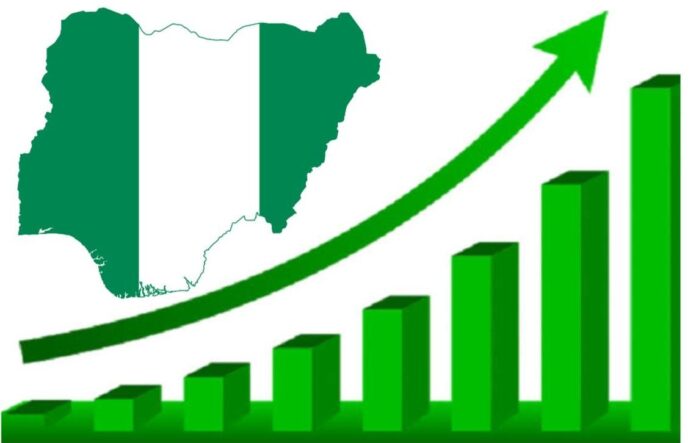Nigeria’s Economy Transiting To Another Model, Not Dysfunctional
Times like this demand nationalistic fervour from citizens, especially those privileged to contribute to setting agenda for national discussion, perception, and perspectives in the public space.
The nation is undoubtedly going through a challenging experience as the federal government commits to reforming and rehabilitating the national economy. In this light, it is self-deprecating for some doomsday, self-styled Nigerian analysts who insinuate that the economy is dysfunctional.
Putting this conclusion in public without substantial evidence to ground the argument is insufferable and play-at-base sentiments. This is especially true when the economy shows progressive indications of response to the many policies being conceptualized and implemented by the federal government to transform it into a more buoyant and inclusive model.
Contrary to the doomsday analysts’ submission, it is a picture of emerging economic hope, progression and resurgence that was aptly orchestrated by the national President of the Nigeria Association of Chambers of Commerce, Industry, Mines and Agriculture (NACCIMA), Dele Kelvin Oye.
In a statement, he applauded President Bola Tinubu’s administration on the occasion of the country’s 64th Independence Anniversary, noting that “Government’s efforts have repositioned Nigeria as one of Africa’s largest economies and ranking among the global 20 driven by growth in sectors like agriculture, the creative industry and the digital economy.”
He added that as the private sector’s voice, NACCIMA recognises the federal government’s efforts to address the economic, political and security challenges inherited at the inception of the current administration while acknowledging that some issues still persist.
We fully subscribe to NACCIMA’s summation of the state of the Nigerian economy, especially considering the data available to us regarding the changing paradigm of the national economy.
Based on our qualitative research on the state of the economy, we can confidently submit that though cost of living remains high, there are enough indicators to show that the policies being implemented by the federal government are gradually addressing the challenges that had historically contributed to the near-asphyxiation of the economy before the coming of the Tinubu administration with its reforming zeal.
Indeed, our desk research on the economy indicates that the federal government is making solid strides in different segments of the nation’s economic spheres. More impressive, to our minds, is the renaissance of the federal government’s saving capacity, targeted at infrastructural development across the 36 states and the Federal Capital Territory (FCT).
President Tinubu approved the establishment of the Infrastructure Support Fund for the 36 states on 20 July 2023 as part of measures to cushion the effects of petrol subsidy removal on the people. We commend the federal government’s fiscal discipline, as exercised by the monthly deduction of N100 billion from the federation’s gross revenue. Thus far, a total sum of N900 billion had been saved between November 2023 and September 2024.
The Federal Accounts Allocation Committee (FAAC) has been deducting the amount into a special account before its monthly revenue distribution to the three tiers of government. In a show of fiscal discipline, it is established that no singular deduction or diversion had been made from the account since its inception.
These savings are helped by the substantial increase in the federation’s generated revenue threshold, which stood at N9.1 trillion in the first six months of 2024, compared to the N5.2 trillion made in the same period of 2023.
This, without doubt is a milestone in federal government’s fiscal management that should be credited to the reforms being consummated by the Tinubu administration.
When further analysed, the increase has an impressive contribution from Company Income Tax (CIT) at N3.45 trillion. This figure is remarkable considering the challenges many companies operating in the country announced in the wake of the ongoing reforms by the Tinubu administration.
Out of the N3.45 trillion CIT collected, local companies account for N1.73 trillion. The figure included N386.49 billion in Q1 and a substantial increase of N1.35 trillion in Q2. For foreign payments, the sum of N1.72 trillion was collected. These are apparent indicators of a robust corporate performance in the nation’s economic domain.
Instructively, we observe with interest the manufacturing sector’s surge in tax contributions, recording a nine-month high in the second quarter of 2024 despite ongoing economic challenges. In Q2, 2024, the total tax paid by manufacturers, which combines both CIT and Value Added Tax (VAT), amounted to N405.86 billion. This implies the sub-sector’s growing resilience and underscores a resurgence of production, productivity, and related activities.
Furthermore, the manufacturing sector’s tax contributions to the coffers headline a paradigm shift from the nation’s historical dependence on volatile crude oil sales for its foreign exchange, and thus, underlines the recently growing activities and fiscal returns from the non-oil sector.
This has positively impacted the foreign exchange reserves since the policy to harmonise the multiple foreign exchange windows was announced soon after President Tinubu assumed office.
In this regard, data from the Nigerian Export Promotion Council (NEPC) show that foreign exchange earnings from the non-oil sector increased to $2.7 billion in the first half of 2024, up from $2.5 billion in the same period last year.
Again, impressively and in tandem with the objectives of the ongoing reforms, this growth is driven by agriculture, solid minerals, and manufacturing. From our standpoint, this marks a significant shift in Nigeria’s export dynamics. For instance, the exponential rise in the export of cocoa beans in the first quarter of 2024 demonstrates the surge in the export of agricultural products. Nigeria’s cocoa exports accounted for 42.4 per cent of the N1.04 trillion agricultural exports for the period, soaring to N438.7 billion in the first quarter of 2024 compared to N108.6 billion in the corresponding period of 2023.
This shows the positive impact of the Naira’s depreciation on export value. Naturally, the price rally has caused Nigerian farmers to begin reviving old cocoa plantations and planting more high-yielding seedlings to replace old and unproductive trees while expanding their growing areas. We tick this in favour of the correctness of Tinubu’s economic reform programme.
Meanwhile, during this period, total non-oil export volume amounted to 3.84 million metric tonnes, covering 211 products ranging from agricultural commodities to extractive industries.
What is apparent is that this performance indicates that Nigerian exports are gradually shifting from raw agricultural products exports to semi-processed and manufactured goods, conclusively indicating that the growth in non-oil exports points to a new direction for Nigeria’s economic development.
The increase in export earnings impacts the foreign exchange reserves, which rose to $39.07 billion on September 19 2024, an increase of 17.4 per cent compared with $33.28 billion in the corresponding period of 2023.
This represents eight months of import cover for goods and services and 13 months for imports of goods alone. The foreign exchange reserve was at a low of $32.8 billion in April 2024.
The new foreign exchange reserve figure testifies to the effectiveness of the policies conceived and implemented by the fiscal authority and the Central Bank of Nigeria (CBN), which is the monetary policy authority responsible for curating and custody of foreign exchange reserves.
On the CBN monetary policy front, it is becoming apparent that the Monetary Policy Committee’s insistence on increasing the benchmark monetary policy rate is now yielding the envisioned results with increased inflow of foreign capital into the Nigerian economy, which has helped the standing of the foreign exchange reserves. By the end of the first half of 2024, Nigeria had recorded a total capital importation valued at $6 billion. This is higher than the $2.1 billion capital imported into the country in 2023 before the reforms that began changing the value of foreign exchange transactions were implemented.
About $199.4 million of the foreign inflow found its way into the nation’s stock market as part of the $3.4 billion invested in the larger capital market by foreign investors showing renewed interest in the Nigerian economy. This represents a significant 36 per cent year-on-year growth from the $756.1m recorded in the corresponding half of 2023.
Because of this substantial investment in the capital market, Nigeria’s stock market segment has demonstrated remarkable resilience, posting impressive gains. For example on 27 September, the last trading day of the first nine months of 2024, the stock market gained N15.66 trillion through capital appreciation as investors continued to invest in blue-chip companies.
This is despite the double-digit inflation rate, unstable foreign exchange market, and soaring monetary policy rate, which are usually a collection of macroeconomic indicators that negatively impact the market.
Despite these challenges, the Nigerian Exchange Limited (NGX)’s market capitalisation closed at N56.578 trillion as of 27 September 2024, an increase of N15.66 trillion or 38.27 per cent compared to the N40.918 trillion or 38.27 per cent it closed for trading at the end of 2023.
The good things happening around the economy may also have a consequential impact on the labour front. For the first time in a long while, Nigeria is recording a change in the make-up of its labour force, with a 3.3 percentage point decline in the 87.3 per cent self-employed working population, according to the Nigeria Labour Force Survey (NLFS) Q1 2024.
This 3.3 percentage point decline in self-employment is reflected in wage employment, which suggests that a percentage of the labour force engaged in self-employment has now found formal engagement in wage employment in Q1 2024. This percentage increased by the same 3.3 percentage points to 16.0 per cent from 12.7 per cent in Q3 2023.
This translates to more Nigerians getting traditional salary-paying jobs by early 2024, thus reflecting a modest but steady workforce absorption into more formal employment sectors.
We anticipate a speedier absorption of more workers from the informal, self-employed segment of the labour force as the economy gains more traction. This position is reinforced by the Central Bank of Nigeria (CBN) Purchasing Managers’ Index (PMI) survey for September 2024, a clear indication of economy on upward trajectory. The composite index is stated at 50.5 points, signalling a continued expansion in economic activities.
Based on this insight, there are still many references to positive policy impacts on different segments of the economy and the enhancement of security capabilities of the various security agencies, which will be the subject of our following Policy Statement.
However, the emerging phenomenon in the new economy is that revenue constrictions which historically characterised the nation’s fiscal space will no longer challenge the country’s development. While some borrowing to supplement organic national income may still be necessary, it won’t be like the wholesale debt binging of the past as more funds are being freed up for use across all tiers of governance.
Therefore, as analysts, we have decidedly sided with the federal government as it transitions the national economy from the anachronistic dependency model to the liberal, free-market, enterprise-driven model.
Of course, we are aware of the challenges associated with policies to wean citizens and corporations off the corruption and distortions of subsidies, either petroleum or foreign exchange. Still, our situation as a country is that we cannot continue in the old ways. It is self-exploitation.
The national economy can be more productive and, in so doing, create more jobs, enable wealth creation, and lift vast numbers of Nigerians out of poverty. This should be the collective pursuit of all Nigerians with good intentions for our national economy and individual citizens’ well-being.
This economy is in transition, not dysfunctional.





